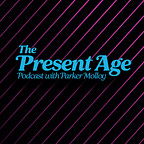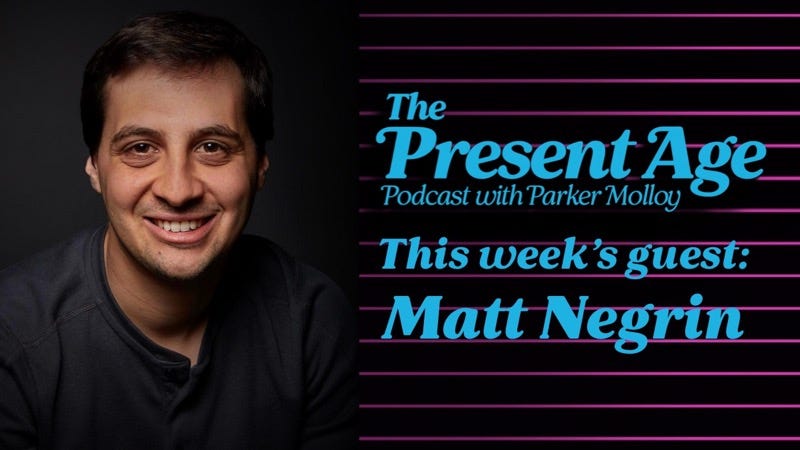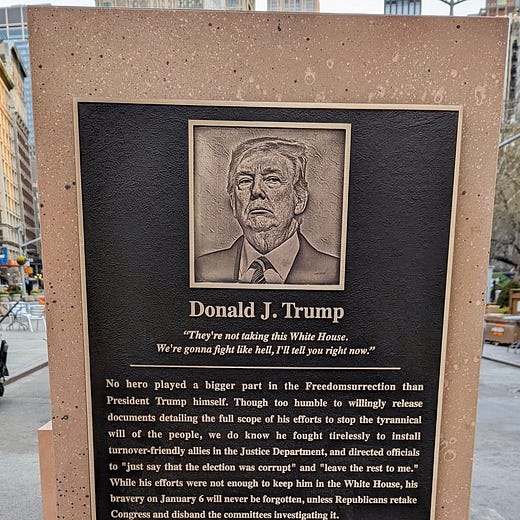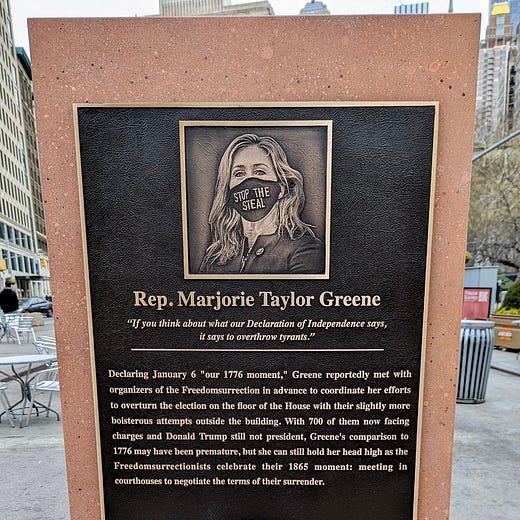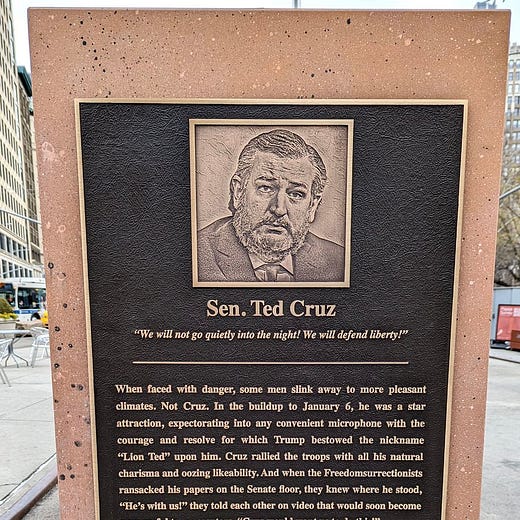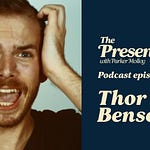Parker Molloy: My guest today is Matt Negrin, a senior producer for the Daily Show with Trevor Noah. And just about the only person on the planet, I know who gets more irritated about the way politics gets covered in the media than I do. Matt, thank you so much for joining me.
Matt Negrin: No, I'm obviously happy to have a contest with you about who is more angry at the media on a daily basis. It's a contest in which we both lose so full in on it.
Well, I was thinking about this. So this is going to be the first episode of my podcast for the new year, because I had to take a month off because I was just like, “Why am I doing this?”
I take a month off because I celebrate January 6th privately. And so I really just a full-on month of just remembrance.
Yeah. Well, I mean, if Christmas starts in November, January 6th starts in December.
January 6th creep is a real issue that we need to address, people are putting up their January 6th gallows way too early.
So I feel like the two of us started the Trump years as relatively sane individuals who just happened to consume a lot of news media. What happened to us?
The question is how did we become totally crazy while also feeling that we're the only sane people in a world in which everyone else is crazy, right?
Yeah. Pretty much.
To me, it feels like the beginning of the Trump years, or the beginning of the Trump term was like, okay, obviously this is a catastrophe, but maybe, just maybe our trusted news media will do the right thing and we'll hold this guy accountable. We'll check him, we'll provide a level of accountability that you and I haven't seen in our lifetimes really. And obviously, that didn't happen. So I think the ongoing frustration with that is what has, at least for me just made me question what is going on with this industry that I was a part of? That I spent almost a decade in, how did I not see that this was kind of inevitable? And then when I left the industry, I was like, all right, now I feel like I can talk about this stuff freely, which is kind of a bad sign that people in journalism can't talk about what's really happening.
And that's been kind of the undertone I think of journalists will tell you privately in the DMs that they agree with what you're saying, but will never say it publicly. And that's bad.
Yeah, well, on that sort of the same kind of thought, I get a lot of people who will text me or DM me to say they liked something I wrote and I'm like, "Cool. I would appreciate a retweet." And they're like, "Sorry, I can't."
It's just, "I'll get in trouble if I do that." I've heard from so many people at newspapers and TV networks who say the same thing. And they're like, "God, you're so right. Thank you for doing this. This really needed to be called out." And my response is always, "You are totally in a position to call this out yourself." And they all say, "Ah, you know I can't do that." And it's like, “ha ha.” Yeah. Well, that's fun. Thanks for your help. But I'm just going to sit back and let this profile of Greg Gutfeld just kind of go out and get tweeted about, and I won't do anything about it.
Yeah. “I won't criticize it because I don't want to get in trouble with the bosses.”
Exactly. I don't want to mention how we gave a platform to Josh Hawley. I don't want to be the person who does that. It's not my role. Yeah.
So speaking of giving a platform to Josh Hawley and giving a platform to Ron Johnson and giving a platform to Roger Marshall and Rick Scott and Mike Ron, and all of those. So is Chuck Todd your nemesis? And does he know that he's your nemesis?
Okay. The word “nemesis” requires the person to acknowledge your existence. So I think the answer is no, I don't think he has ever once acknowledged at least explicitly, any of the good faith. I would say criticisms about Meet the Press, but I've heard from enough people to know that like yeah, he's aware of it. They're aware of it. They're all aware of it. And one of the NBCPR guys, Richard Hudock has engaged with me on Twitter. So has another producer for Meet the Press. So yeah, they're aware, but they do not respond anymore and I think part of it is because they probably know it's not a good look to be fighting on Twitter. But also I think they know that some of these things are indefensible.
So you can't defend Chuck Todd for putting Roger Marshall, who is a Senator who voted to overturn the election on Meet the Press. You can't defend that. It's an obvious message that Chuck Todd thinks it's okay to give a platform to people who tried to overturn the election. And that's simply something that if you're a good faith journalist, you probably don't agree with. So I don't relish the idea that there's a guy on TV who is my nemesis, but at the same time, why aren't more people talking about this? It seems very dystopian. I don't know. What was your feeling after January 6th? I feel like there were a bunch of us on the left who were saying we have to hold these people accountable by not giving them platforms or at least by branding them explicitly every time they're mentioned or on the air with a reminder that they did this thing. Right. Do you remember that feeling?
Oh yeah. I mean, I wrote an article for Media Matters in December 2020. So it was before January 6th where I was just like, “What they have done is an unacceptable attack on democracy, et cetera, et cetera.” And yeah, so then of course, then January 6th happens and the-
You brought up Mike Braun, that's a triggering person for me because I remember in December, I think it was December 6th, I hope I'm right about that. I'm going to Google it real quick because I'm pretty sure I'm right. I've just ingrained all this stuff into my fucking head. Yeah. December 6th, 2020, Mike Braun was on ABC's This Week and he floated this conspiracy theory that boxes of ballots were being hidden under a desk in some state and that there was a video showing how the Democrats were trying to steal the election. So this is a month after the election. It's, I guess three weeks after Biden was declared the winner. And you have a sitting senator on ABC talking about this conspiracy theory. That is at the time, the media was feeling out this world, right?
“How many senators are going to help Trump try to overturn the election? What is the line?” And Mike Braun was seen as a non-crazy Republican by a lot in the media. And then he goes on This Week and pushes this thing out. To me as a producer or as a host or as a person at ABC that should have been the cutoff line, like okay, we're ending this interview. And it just went on for six minutes. They didn't even talk about the thing they were going to talk about, they just talked about voter fraud and that's millions of people who are seeing that and thinking what is this video? What is he talking about? Maybe there is something to this. That to me was like, Mike Braun is not Josh Hawley, he is not Ted Cruz and that's kind of the point.
They can all be pushing this conspiracy theory or different versions of the conspiracy theory. And the media is going to accept them because they don't have this outwardly crazy Marjorie Taylor Greene-ish stain on them. Mike Braun looks like an honorable person, but if you look at what he really does, he goes on Newsmax and talks about the same thing. So that's why that guy is very triggering for me. Months later you have Donie O'Sullivan, who I think is a really sharp reporter at CNN going to these QAnon rallies, interviewing people who are saying the election was stolen. And they specifically cite the thing Mike Braun talked about. So, this is how misinformation spreads. It spreads on mainstream media. And the fact that these networks keep putting these people on, to me, indicates they either don't know their role in it, or they're just totally fine with it. I don't know what another option would be.
Yeah. I mean, that's... God, I remember when I first got hired at Media Matters, one of the first things I did was I flew out to DC because we decided to do a thing where I would work in the office one week and then spend a few months working from home and then kind of repeat that. And I flew into DC and I saw a guy wearing a shirt that just had a big letter Q on it, standing on the steps of the Supreme court with a selfie stick, taking a picture where he is making a real tough guy face. And it was just him by himself. And it was the first time I had ever seen anyone in person wearing a QAnon kind of thing. And I thought, “Ha ha, that's so funny.” It's not so funny anymore.
Part of the issue is that these views aren't debunked on TV instead what you get is you get, "Hey, do you think Joe Biden won the election?" That's not good. Presenting it as a question is part of the problem.
Right. And there are multiple journalists who have done this in GOP primary debates over the past year, there was one in, I think it was Hugh Hewitt who did it in the, oh, what race was it? I can't remember, but he was moderating a debate. And he said, do you believe Joe Biden won the election? Okay. You're a journalist on MSNBC, you should not be allowed to do that. There was another local news reporter in New Mexico who was moderating a special house race primary and, or I think it was actually the general election, and she said, "Who do you think won the 2020 election? And how do you plan to work on work with others who disagree with you?" Don't frame this as an issue, it is not an issue.
Part of the problem with the Q stuff that, what you just said made me think of is, when QAnon first started becoming a topic that the mainstream media had to talk about. They did it really poorly. And I remember the Q baby at the Trump rally, someone held up a baby with a Q on the shirt and it was like Q baby. And then QAnon went nuts. And then someone was wearing a Q dress and the letter Q. And so then the media had to be like, all right, let's do QAnon. I remember Lester Holt, the anchor of the NBC Nightly News, doing a whole thing on QAnon, on what is it? And they just really did not do a good job explaining that.
This is rooted in antisemitism, a conspiracy theory that feeds a lot of extremist impulses. It's an online-based thing. Ben Collins and a handful of reporters do really good work on this stuff at these networks and the rest of the journalists there just kind of don't, it feels like they don't read it or they don't talk about it. They just kind of say, QAnon, it's part of the right-wing. No, it is so much deeper than that. And it's basically all the people at the January 6th insurrection are QAnon believers. Technically, if you wanted to extrapolate a lot of those views, Kevin McCarthy believes half the shit in QAnon, but you would never get reporters saying Kevin McCarthy is a QAnon believer because he hasn't said "I'm a QAnon believer." But he does believe that George Soros is in charge of the federal election takeover or whatever. That's a Qanon conspiracy theory. So he is a Q believer. And it shouldn't be weird to say that, it should be the reality.
And part of the problem I think is that these things start online and journalists generally seem to not take things that start online seriously, which is a gigantic problem because so much of our lives are online. So you have all these journalists who've been around for 20, 30 years, or whatever. And things are not the same now as they were then. And so you have newer journalists, you have people like Ben Collins who are doing great work with a lot of this internet-based stuff at, in the... Who else? Brandy Zadrozny.
Oh yeah. Yeah.Yeah. Brandy Zadrozny and Ben Collins are kind of like the tag team misinformation reporters at NBC.
And yet, sometimes NBC will do things that touch on those topics that they don't involve those two and which is just mindblowing.
Right. Feels extremely strange. Yeah. Feels extremely weird. Yeah.
That's why I find your approach to the internet generally kind of interesting because you're trying to fight misinformation with tweets and with... I like your TikToks.
I haven't done them in a while.
I know, but they're funny.
All right. You know what Parker I'm going to do one today or tomorrow, just because you have formally requested it. I'm taking that as a request.
But no, I mean they're good. And TikTok is one of those places where it's one of those things where I start to feel way too old and it's weird kind of aging into something where it's like, “Oh no, a social media platform feels like it's too geared towards the younger kids.”
Yeah. But there's a version of TikTok that doesn't have to be that for us. I think TikTok is popular among the generation younger than us because it's so easy to embrace video culture and phone culture. All we have to do is just kind of lean into that. It doesn't have to be us being like, ah, we're the old cranks. It can just be us being like, okay, I'm going to just slightly change the way that I view how to get a message out. There are older people on TikTok who do really, really well. And I think it's because video just comes naturally to them, but the medium is video rather than text. I think that's just the big difference.
And I appreciate that you put in the effort to try to find that because I do feel like there's sort of a formula to a lot of the way information travels online and TikTok is a place where a ton of misinformation just thrives because it's harder to check. You can't just do a word search to find something on TikTok. You have to actually find out that some creator on there believes objectively insane stuff.
And then go, “Okay, so this person's a Q creator, so what do we do about it?” And I don't know what the answer to that is other than the fact that most of the time, if you bring this up to a lot of the older, the legacy journalists, they will go, well, it's just the internet. That doesn't count.
It has the same tone-deafness as an article that's written about people having a reaction to some viral moment. And the headline is like, "The internet loves..." It's like, no, no, no, the internet is a collection of people, they're expressing themselves on the internet. The internet is not a sentient thing. I think the approach to social media has to be, and this might sound very pedantic, but I think that journalists, writers, and kind of like the conversation havers or the conversation starters either rely on social media or use social media to develop their kind of first and second level takes on things. And that's why it's important to get in there early and point out that like, okay, this person, an example from today, Alyssa Farah, who's spreading misinformation about the vaccines, who is hired by CNN, which is insane.
Let's get in there early and point out how she was a writer for WorldNetDaily, a conspiracy theorist birther website that was run by her father. And then she worked for Donald Trump for a year, spreading COVID misinformation. And now is hired by CNN. Getting in there early hopefully shapes the way that other people see that story. But a lot of, as you just said, legacy journalists, they might be on Twitter. They might be looking at tweets, but they don't really participate in the conversation.
And one example of this that I just remembered was in September 2021. So 3, 4 months ago when Ted Koppel, who is 81 years old, the most legacy journalist you could have, went to Mayberry, the fake town in Andy Griffith. It's like Mount Airy in North Carolina, which is the inspiration for Mayberry. So he goes there to do a trolley tour and talk to Trump voters. And all he did was exactly what you were just saying earlier was like, "Who do you think won the election?" And they're like, "Mm, Donald Trump." And he is like, "Interesting." Like, this was a really bad piece of journalism that CBS Sunday morning aired as how quaint, this cool little town. Oh, the people here have some interesting thoughts. Hey, these are people who are radicalized on Facebook and Fox news. They think that QAnon, they think that Q is the leader of a secret plot. These people are psychos and you should not be giving them this platform. And Ted Koppel has no idea what any of that is about.
No. None. He's like, how could you believe this? Well, I mean, because the internet told me. I mean, just as we're discussing this, it was only a couple of days ago that Joe Rogan was pushing some sort of vaccine misinformation on his show, which is kind of his thing.
He really leaned into it.
Yeah. And someone corrected him and he's like, shifting the goal post to be like, "Well, actually I read somewhere..." And that's all people, I mean, need that's all people need these days is just, "Well, I read somewhere that something agreed with me." I mean, I could write something that says, yeah, the vaccine makes you grow a third arm. I don't know. And, it's not true, but I could put it on the internet.
I think the way that this clip, if anyone wants to check this out, I feel like if you go on Twitter and search, Joe Rogan, Josh Zepps, Z-E-P-P-S. You'll find this clip, but it was Joe Rogan pushing this idea that young kids can develop a complication if they get the vaccine. And then this guest was like, you actually have a higher chance of getting it if you get COVID. Rogan was like, no, that's not true. And then they look it up, which is the only thing redeemable about this is, well, at least they looked it up. And then it turns out that Joe Rogan is wrong, what he was saying was false. And then as soon as he realizes he's false, he just questions the nature of journalism.
He's like, “Well, how do we know that? When we read these things, it's like, where are we getting this information?” Buddy, you Googled it. You looked it up, this is a reflection of how you do your own research and how you are relying on your own preconceived notions of what is true or false based on what you need to say. And because he knows his listeners want to hear the skepticism, the hesitation, just the falsities, he will lean into it and he'll go back the next day and the day after that and keep pushing it, having not learned a thing, because he's not interested in educating people, he's interested in amassing a following. And that is what you kind of see all across right-wing radio, smaller podcast networks, even these like Fox shows, OAN, Newsmax. It's all people who are probably mostly in on it. They know what they're saying is bullshit. And if they happen to believe it, that's even worse. But I feel like most of them don't, they just know that it's really good for them. Although it's impossible for us to know, I'm not in Pete Hegseth's head, he might really not wash his hands. He might really think germs don't exist.
See, now you sound like a New York Times reporter circa 2017 where you're like, I” can't say ‘lie.’”
“I don't know it's in his heart. I don't know what's in Donald Trump's heart. He might not be lying. He might truly believe, Donald Trump might really believe that Hillary Clinton used the Venezuelan treasury minister's brother to facilitate a deal with Barack Obama's niece. He might believe that. He might believe that and we don't know. And so we have to call it, like an untruth or a false claim.”
An “unsupported claim.” “We will give it one Pinocchio.”
Oh, man, the Pinocchio system. I mean, if there ever were a metric for how we need to evaluate our world, I love seeing Glen Kessler, the Washington Post Pinocchio guy give Biden four Pinocchios. If you gave Trump four Pinocchios on anything, no one else can ever get four Pinocchios. There cannot be a comparable way to say Joe Biden also did a bad, come on, there is no comparison. Joe Biden misstating a percentage on COVID cases is nowhere close to Donald Trump being like "Ghosts voted in the 2020 election."
So in November, Connecticut Senator Chris Murphy tweeted, "The only way fascism wins is if the free press covers fascism versus democracy, like just another cats and dogs political fight." I have bad news for him.
First of all, zero Pinocchios.
That's true. But that's exactly how it's been so far. And that's what kind of worries me. At the time you quoted that and you wrote "Two hours ago, Chuck Todd invited a fascist big liar on the top-rated Sunday show to state that vaccines don't stop the spread of COVID and didn't offer a chance for a Democrat to respond to anything he said." And I think that kind of sums up where we're at.
Parker you giving me the play-by-play of my own tweets is any Tweeter's dream. Let's go back.
“And then you got this many likes and then...”
Oh my God. Okay. Yeah, it's good. This is net-positive. I think for the cause, which is people in Congress have a bully pulpit. They can go on TV and talk about this stuff. They can tweet stuff. They can give interviews, they can write op-eds. They have an outsized voice in the conversation because of the way that our media respects elected officials for better or worse. So it's good that Chris Murphy, Brian Schatz, Ted Lieu, Eric Swalwell, Tim Ryan, all of these kind of resistors, the lefties are taking up the message for media reform or media awareness, media literacy. I don't really know what to call it. So I like that. I don't think enough of them are doing it to make it as successful as we'd want it to be, but it is good that they're aware of it.
And to your point, it also is really unfortunate that the media doesn't really change at all. And it's not just Chuck Todd. I think Chuck Todd is one of the prime examples of it because he has the biggest platform on Sunday mornings and that still has a sizable audience. And it influences a lot of discussion for at least 18 hours on social media. But there are others too, who kind of either agree with the worldview or not the worldview, but agree with the philosophy of we still need to give these people who deny vaccines a real platform, or just giving Ted Cruz a voice on anything seems crazy to me. But there are a lot of journalists in that world who believe it.
And so the cats and dogs thing, the political horse race thing is a separate criticism to me. Yes. Politics is covered with this frantic nature of who's up, who did a good zinger, who didn't, and there's a place for that. And it's anything before 2015. That doesn't really longer apply, I think. But that is also different than giving a role or sorry, giving a platform to the people who are rooting for the end of truth and democracy.
So it does go hand in hand, obviously, those people who want to cover politics as a horse race also probably think that those people should be given a platform, but they are kind of two different issues for me. And I mean, one of my unpopular among our cohort opinions is that I do think politics can be covered in a horse race way at times.
I don't think that's necessarily bad. I think polls are interesting and good for the most part. It's when you're polling things like critical race theory and then running a headline afterward that's calling it education instead of what it really is, which is just racism. And I think the sanitization of those really dark elements of the Republican party is what happens when you cover things through a horse race prism in 2020, 2021, 2022. So that kind of needs to change for us to have a more honest media, but obviously a very low chance of that happening.
Yeah. Well, there's, God, there was something recently, let me, I'm just going to find this. So there was a poll that Harvard did and I'm trying to find- Okay. So this poll, this was polled by Harvard's Center for American Political Studies survey.
“So how do we even know where we're getting these reports,” I'm being Joe Rogan. “We're Googling stuff and just reading it.” No, I'm kidding. Go ahead.
And here was the question. There are only two possible answers. Do you think the schools should promote the idea that people are victims and oppressors based on their race? Or should they teach children to ignore race in all decisions to judge people by their character?
Wow, that's amazing. So it was obviously 70% weighted toward the position of “Wait a minute, we shouldn't be doing the bad thing.”
It was 63/37 in favor of ignoring race in all decisions.
Just great. Wow.
And the funny thing is, so someone tweeted, this is an actual question from the survey and Andrew Sullivan responded "And a good one." That's what he said. Well, no, it was not a good question.
The idea of doing push polls, in general, is kind of slimy, but something on that, the wording of that is so deliberate and so designed just to get a Fox News headline that it feels, I don't know, it's gross. Ugh. Yeah. I hate hearing that. Oh my God. Some of the words in those things, what was it "completely ignore"?
Yeah. Yeah. It was "Should they teach children to ignore race in all decisions to judge people by their character." The fact that they had to add "in all decisions" was like-
Isn't Mark Penn part of a polling group that's called Third Way or something, or some middling, his whole, I could be misrepresenting him. I thought he was part of the Third Way thing or No Labels or something.
He is the Stagwell group. I don't know what that is even, but…
I was going to say some of these fake Democrats, or fake centrist people are part of this idea that there has to be a third option. It doesn't have to be Democrats or Republicans, oh, but your question here is two very extreme options right now. If only there were a third way or a more purpleish answer to this quagmire.
The funny thing is, so this poll, the pie chart they used for it is the red and blue, and blue is people are victims based on their race and red is ignore race. So I think it really gets out there.
Obvious. Yeah. I remember in 20- I think 14 or 15, Fox News, it might have been Doug Schoen, that guy who did a poll and it was, “Do you think the country is going to hell in a handbasket?” That was the question.
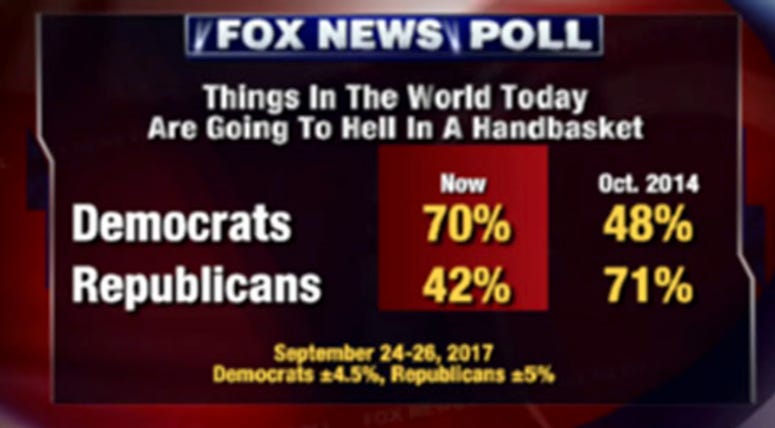
There was the Lou Dobbs one that was like, “Is Trump doing great, greater or greatest?” It was basically that old Colbert bit.
Okay, that screenshot to me is the defining screenshot of Trump propaganda. “How would you rate President Trump's handling of the China virus,” is what it said. And it was like “Very good, great, and super.”
Stuff like that, it is made not just for the Fox News audience, it's made for the internet. And that's why I'm so interested in this topic generally, because the way we talk online, people like to be like, “Well, no, it's not real life. It's the internet. It's not real life.” What do they think real life is?
I know. Honestly, but also I'm glad Twitter is not real because real life sucks. Twitter is where I want to be now.
Only marginally better than real life, which is also bad.
Have you seen real life? It's terrible
So the last thing I wanted to ask you about before I let you go is, so when the New York Times got rid of their public editor position, they told people to tweet. They said it was unnecessary because people could just tweet. Twitter is the public editor, which that seems like a bad idea, but also there is no group of people less inclined to change or reflect based on tweet responses than New York Times reporters, it seems. How do you think that’s been going?
I have a feeling that the intention behind that, I think was good. I think the intention being, “We want to hear from readers and we acknowledge that social media is where our readers have the fastest and most direct way to let us know what's going on. And a handful of our reporters engage with people on social media that can all in an ideal world, in which everyone is acting in good faith and willing to acknowledge their own shortfalls or errors, which can lead to a much better transparent reporting process.” That, I think, was the intention. In reality, obviously, it means we pile on the New York Times for bad headlines, and they, I guess we don't know what their real response is, but it feels like they don't change anything in a significant way.
But that said, there's no way that all of these comments can't live in their heads at some level, which is why I do feel like having rapid response to bad framings or all these diner stories. I want to think that it's good because it will affect what they do in the future. I don't know if that's true. Part of the reason that I am skeptical of how effective tweeting at journalists is, is because a lot of the journalists at the New York Times are really good and they do really good reporting and exposes and then some fucking editor will undermine it all with a shitty headline. And people don't understand that reporters don't write headlines, which for the most part, is the case. Reporters have very little to do with the headlines as a...
This is my big brag of the day. I used to be an intern at the New York Times. I was on the copy desk and the copy editors write the headlines and they work with the reporters on it if they want to, but editors write the headlines and then a different editor rewrites it. And then a page one editor rewrites that. It goes through a whole process. The headline is normally what we're most upset about because that sets the tone for the story. And we are rightfully upset about that. Those editors should be better at that.
It's also the only thing that most people see. Most people don't click on stories. At this point, this thing is so outdated, but it was a 2010 survey [Ed. note: it was a 2014 survey], I hope that there's a new version coming out at some point, but it was an old survey that was basically 60% of Americans haven't clicked on a story in the past week. So they're getting everything from what they see on Twitter and what they see headlines as they pass by.
Wow.
So that's why you can't just have a little misleading tweet or a little misleading headline Because that's what most people will see.
Did you read that story or did you just read the headline that said 60% of people?
Just read the headline that said 60%.
Sounds good.
And the funny thing is, I remember when it came out, Chris Cillizza wrote about it and it was like, "Dude, how do you not understand?!”
The clickbait master.
Well, as it relates to headlines, yes, I think everyone acknowledges that's a huge issue. And I think that should put more emphasis on the role of editors at newspapers, like the New York Times, which by the way, there are a lot of headline writers there and headline writing is kind of an art at the Times and that needs to be reevaluated because a lot of their headlines have been really bad. And we get a lot of the reaction to it in this, I think, okay. So I think a lot of the reaction to those headlines kind of snowballs into this narrative that the New York Times is being out of touch, being tone-deaf, whatever. And then it's easy to go after the people on the byline, the journalists who write the story are the only ones with their names on it. And the editors aren't.
That, I think, is not always fair. That said, if Peter Baker writes a stupid story and is quoting people stupidly and is making bad analysis about how January 6th is just a red versus blue reality thing, sure, he's wrong for doing that. But I think a lot of the times when [people] are going after headlines, it's good to know, it's important to know that the reporters, aren't the ones who write the headlines and this is such a weird thing to try to educate people about because it's not intuitive. You would never think that that's the case, especially because in a lot of new media websites or digital publications, reporters do write the headlines and they often write it tying into the story, which is fine. That's a good way to write for a digital audience, but it's not always the case at these legacy papers that we focus on because they do have a huge circulation.
I'm also thinking right now of the cliche Buzzfeed writer, who's like, "Okay, I have to do a story on the 43 greatest kangaroo gifs." And then the editor's like, "How about we do the 43 great kangaroo gifs?" And the writer's like, "That's not the headline I want."
“It will restore your faith in humanity.”
Yeah. “I would never say that.”
And so, yeah, Matt, is there anything else that I haven't asked that you want to mention or any projects you're working on or anything?
Oh, man, you covered so much.
Anything at all. The floor is yours.
I have a perfunctory plug for this thing we did at the Daily Show where we've put up these January 6th monuments. If anyone wants to check this out, just go online and use the hashtag daily show monuments. But it's basically a tribute to our wonderful Freedomsurrection heroes who tried to overthrow the government on January 6th. And we just felt that we needed to honor them, kind of the way that civil war generals are honored in the south. So we put up some monuments to them. I would encourage everyone to just educate yourselves about our history and our heritage before the woke right-wing mob tries to tear them down.
See, what we need to do, though. If you really want to be like the way that civil war monuments are celebrated in the south, we should wait 70 years and then put the monuments up just aggressively too.
Okay. This is a really crazy thought is in 70 years, what will, Parker you and I will have to do a podcast in 70 years and see if people even know what January 6th is.
I hope I'm dead.
I hope I'm dead in seven years.
Seven, 70, whatever. It's all the same. But Matt, thank you so much. It's been a lot of fun talking to you.
This is the least angry I've been in so long.
I know. So now it's like, I'm going to close this and go look at Twitter. Yeah. I'm sure things will be fine.
We'll go get angry together online.
Sounds good.
Thanks, Parker. Thank you so much.


